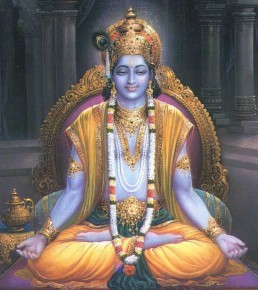Swami Chinmayananda
Swami Chinmayananda Commentary
Since each mind-intellect equipment is governed and ruled over by its predominating quality (guna), each equipment has its own nature to reckon with. A vehicle that can efficiently work in one medium of transport cannot with the same efficiency work in another medium, a car is efficient on the road — but on water? The Rajasic mind cannot fly into meditation and maintain its poise as easily and as beautifully as the Sattwic mind can. Similarly, in the field in which a Kshatriya can outshine everybody, a Vaishya or a Shudra cannot. To rise to the highest station in social life all men cannot have IDENTICAL opportunities. A social system can only give “equal opportunities” for all its members to develop their gifts in and through life. In order to prove this thesis, the various duties are prescribed that will help to mould the personalities of the different types of men.
AGRICULTURE, BREEDING AND TENDING CATTLE, TRADE AND COMMERCE — These are three fields in which a Vaishya can function inspiredly and exhaust his imperfections. These are duties towards which he has an aptitude because of his own nature. Work in a spirit of DEDICATION AND SERVICE IS THE DUTY OF A SHUDRA.
The mental temperament of a man determines what class he belongs to and each class has been given particular duties to perform in the world. If a man who is fit temperamentally for one type of work is entrusted with a different type of activity, he will bring chaos not only into the field but also in himself. For example, if a Kshatriya were asked to fan someone in a spirit of service, he may condescend to do so, but one will find him ordering somebody else, almost instinctively, to fetch a fan for him! So too, if a man of commercial temperament, a Vaishya, comes to serve as a temple-priest, the sacred place will become, ere long, worse than a trading centre; and again, let him become the head of any government, he will, out of sheer instinct, begin doing profitable “business” from the seat of governmental authority; people call it corruption!!
We must analyse and discover the type of vasanas and temperaments that predominate in each one of us and determine what types of men we are. None belonging to the higher groups has any justification to look down with contempt upon others who are of the lower types. Each one serves the society as best as he can. Each one must work in a spirit of dedication for his own evolution and sense of fulfilment. When each one works thus according to his vasanas and fully devotes his attention to his prescribed duties, it is said here that he will develop within himself and attain, in stages, the ultimate Perfection.
When a person works devotedly, in the proper field and in the environment best suited to him, he will be exhausting the existing vasanas in him. And when the vasanas are reduced he will experience tranquillity and peace within and it will become possible for him to discover more and more concentration and single-pointed contemplation.
WITH THESE FACULTIES IN HIM MAN CAN ULTIMATELY REACH THE STATE OF PERFECTION — THE LIFE IN THE SELF — HOW?
Adi Sankara Commentary
Svabyavajam, the natural; vaisya-karma, duties of the Vaisyas, of the Vaisya caste; are krsi-gauraksyavanijyam, agriculture, cattle rearing and trade: Krsi is tilling of land. Orre who rears cattle (go) is goraksa; the abstract form of that word is gauraksyam, animal-husbandry. Vanijyam means the occupation of a trader, consisting of buying and selling. Sudrasya, of the Sudra; api, too; svabhavajam, the natural; karma, duty; is paricaryatmakam, in the form of service. When rightly pursued, the natural result of these duties enjoined for the castes is the attainment of heaven-which act is evident from such Smrti texts as, ‘People belonging to the castes and stages of life, who are true to their own duties, experience after death the fruit of their actions. And after that, as a result of the remnants of their merits they are born in some excellent region, caste and family, with greater piety, longevity, learning, conduct, wealth, happiness and intelligence’ (Ap. Dh. Su. 2.2.2.3), etc. And in the Puranas also it is particularly mentioned that poeple belonging to the (different) castes and stages of life come to have specific results in the form of different worlds. But this result that is going to be stated follows from a different cause:
The Bhagavad Gita with the commentary of Sri Sankaracharya – Translated by Alladi Mahadeva Sastry
Holy Geeta – Commentary by Swami Chinmayananda
The Bhagavad Gita by Eknath Easwaran – Best selling translation of the Bhagavad Gita
The Bhagavad Gita – Translation and Commentary by Swami Sivananda
Bhagavad Gita – Translation and Commentary by Bhaktivedanta Swami Prabupadha
Srimad Bhagavad Gita Chapter 18 – Verse 44 – 18.44 krsigaur aksyavanijyam – All Bhagavad Gita (Geeta) Verses in Sanskrit, English, Transliteration, Word Meaning, Translation, Audio, Shankara Bhashya, Adi Sankaracharya Commentary and Links to Videos by Swami Chinmayananda and others – 18-44

